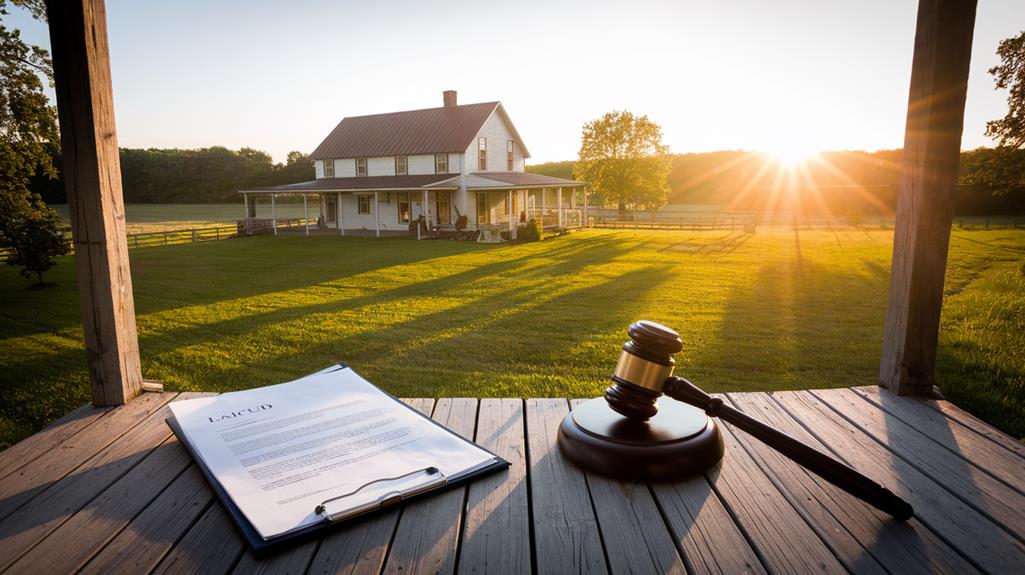When thinking about what happens to a homestead property in Florida after someone dies, you might ask if probate is needed. You may feel safe knowing your main home is protected by strong homestead rules.
Whether probate is needed depends on a few things. Does one person own the property alone? Is it safe from some people who are owed money? What happens when you give this property to your family after you die? These questions are important to answer.
Key Takeaways
- Florida homes marked as homestead don’t need full probate when the owner dies, but they might need a shorter process called summary administration to move ownership properly.
- Summary administration can be used if the estate is worth less than $75,000 (not counting the homestead) or if the person has been dead for more than two years.
- Homestead homes are safe from most people the owner owed money to, but summary administration helps quickly and correctly give the home to the heirs.
- To avoid problems with probate, make sure the dead person followed Florida’s homestead rules, like owning the home and living in it as their main house.
- Working with a lawyer who knows about probate helps follow Florida laws and smoothly pass the homestead to the heirs.
Understanding Florida Homestead Protections
Florida’s homestead law strongly guards your main home, keeping it safe from being sold by people you owe money to, except in certain cases like mortgages, taxes, and builder’s bills. This protection means you won’t lose your home due to money problems you didn’t expect.
Florida’s homestead laws don’t set a top value for the property to be called homestead, giving good protection for homeowners’ assets. The protection also covers different types of main homes like houses, condos, and mobile homes.
Florida’s special homestead rules make it even safer. The law includes nearby land up to 160 acres outside cities and up to half an acre inside cities. Also, no one can put a claim on the property unless they’re specific groups like the State or builders.
If you die, your family members still get protection from people you owe money to, making sure the homestead stays with them without trouble. With all these protections, knowing about Florida’s homestead law is very important for keeping your money safe and feeling calm.
Probate Requirements for Homestead Properties
You must follow special probate rules to make sure your protected homestead property goes to your heirs smoothly. Florida law allows a homestead property to go straight to your spouse or heirs, but you can’t always skip probate.
Probate helps settle any debts and makes sure assets go where they should. For a Florida homestead property to go through probate, it must meet certain rules, like being the owner’s main home or being owned by more than one person together. If these rules are met, the estate might qualify for a quicker probate process.
It’s also important to think about taxes when transferring a homestead. Florida homestead properties don’t have to pay some taxes, but the state still charges transfer taxes. If someone dies without a will, their homestead property is given out based on state rules.
To avoid probate completely, you need careful estate planning. Talking to a knowledgeable lawyer can help make sure your homestead property is protected and goes to your heirs without problems.
 Eligibility for Summary Administration
Eligibility for Summary Administration
You can use summary administration if the estate’s worth, not counting the main home, is under $75,000, or if the person has been dead for over two years. This quicker process helps speed up giving assets to heirs while making sure things are done well.
Requirements by State
| State | Estate Worth | Time Since Death |
|---|---|---|
| Florida | Under $75,000 | Over 2 years |
| Oklahoma | Under $200,000 | Over 5 years |
| Texas | Changes based on court | Not set |
Knowing these rules is key to figuring out if your estate can use summary administration, which can greatly affect how fast and smooth the probate process goes.
Clearing Title to Homestead Properties
Ensuring a smooth transfer of a homestead property, especially when dealing with the complex process of clearing its title, can be tricky. Clearing the title to a homestead property is hard but very important for a successful ownership transfer.
In Florida, special laws protect homestead property from people who are owed money. It’s crucial to know these laws to handle the probate process correctly.
Summary administration is one way to clear the title, making sure all needed steps are taken to transfer ownership without problems. This involves filing two papers: a Petition for Summary Administration and a Petition for Homestead Determination. These must meet the rules in Chapter 735 of Florida’s laws. When approved, the probate court will give an order that decides the homestead property, allowing the title to be transferred to the named heir.
For a smooth process, it’s vital to work with a good lawyer who knows a lot about probate. They’ll help you through each step, making sure all needed papers are filed correctly and that the homestead property is properly labeled under Florida law.
Transferring Homestead Exemption Benefits
You might be able to move your homestead exemption benefits from your old home to a new one. This can lower your taxes a lot through the ‘Save Our Homes’ limit, if you follow the rules in Florida law. This process can greatly change your money situation, especially when moving to a new house. To make sure everything goes smoothly, it’s important to know how to keep your homestead benefits on your new property.
It’s vital to take steps to avoid problems with probate. Begin by learning about Florida’s homestead exemption rules and the ‘Save Our Homes’ change, which puts a limit on how much the value of a homesteaded property can go up each year for tax purposes.
Get all the needed papers ready, and turn in your application to the right offices on time. By doing this, you can successfully move your homestead exemption benefits, keep big tax savings, and protect your property from possible probate fights.
 Homestead Property Transfer Procedures
Homestead Property Transfer Procedures
When you die, your homestead property benefit goes to your close family or living spouse without debt claims, but only if your homestead had no loans or debts on it. Sadly, your family still needs to follow steps to clear the property of any money owed. This makes sure they can keep the homestead property without creditors bothering them.
To finish this transfer, your family will need to:
- Find all debts, loans, or other money owed on the property.
- Clear the property of these debts by paying them off or talking with creditors.
- Send the right papers to the county property checker to move the homestead tax break.
- Change the property records to show the new owners, making sure the homestead benefits keep going.
Frequently Asked Questions
Can a Non-United States Citizen Own a Homestead Property in New York?
Non-U.S. citizens can buy and own a homestead property in New York. There are no laws stopping this. However, foreign buyers must follow special rules. They need to pay certain taxes and report their purchase properly. It’s important to understand and follow all of New York State’s laws about property ownership for non-citizens.
Are Homestead Exemption Limits Different for Married Couples in Florida?
In Florida, married couples don’t get different homestead exemption limits. The amount you can claim depends on where your home is in the state. The limits range from $82,775 to $165,550, based on your county. Being married doesn’t change how much you can exempt.
How Does Summary Administration Affect the Transfer of Homestead Property?
When handling a homestead property transfer, summary administration can make the process faster. It lets people who are set to get the homestead property inherit it right away. This means they don’t have to deal with people the deceased owed money to. It also makes sure the homestead stays protected, even after the owner dies.
Can a Homestead Property Be Attractined to Pay Taxes or Debt Obligations?
Yes, a homestead can be used to pay taxes and debts, but some rules protect it. Having a homestead doesn’t stop people you owe money from trying to claim it, but the law usually shields the property if it’s officially recognized as a homestead.
Is a Homestead Property Transferable to a Trust or Estate?
When making plans for your belongings after death, you can move your homestead property into a trust. This helps protect it and makes it easier to give to your family members later. It ensures your loved ones get the property safely and don’t face legal problems.
Conclusion
Understanding how homestead properties interact with probate in Florida can be complex. While homestead properties enjoy strong protections under Florida law, they may still require a summary administration process to properly transfer ownership after the owner’s death. This is especially true if the estate is worth less than $75,000 (excluding the homestead) or if the person has been deceased for over two years. The process involves clearing the title, transferring homestead exemption benefits, and navigating specific transfer procedures.
Dealing with homestead property transfers and probate can be challenging, but you don’t have to face it alone. At Real Estate Law FL, we specialize in guiding Florida residents through the intricacies of homestead property laws and probate processes. Our experienced team can help you determine if summary administration is right for your situation, assist with clearing titles, and ensure a smooth transfer of homestead benefits. Don’t risk making costly mistakes or losing valuable protections. Visit Real Estate Law FL to learn how we can help safeguard your homestead property and streamline the probate process. For personalized advice tailored to your unique circumstances, email us or call us today. Let us help you protect your family’s home and legacy.

